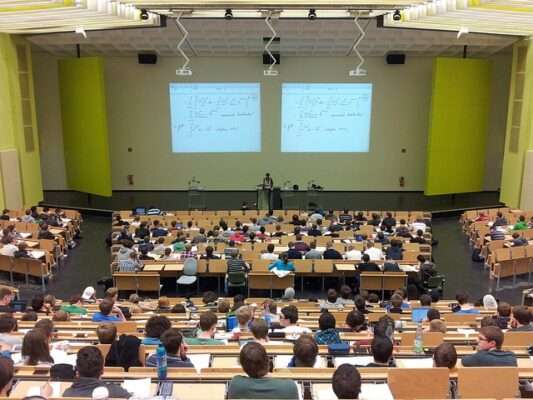Objectives:
- To develop critical thinking and analytical skills.
- To develop effective communication skills, including listening, speaking, and presenting.
- To enhance leadership skills and the ability to work in a team environment.
- To learn how to communicate complex scientific concepts to others.
- To increase self-confidence and improve public speaking skills.
- To develop an understanding of different perspectives and opinions on scientific topics.
- To develop the ability to constructively and respectfully engage in debate and discussion.
Benefits:
- Group discussion and presentation skills help science school students to develop their communication and interpersonal skills, which are essential for success in any scientific field.
- Science school students who have strong group discussion and presentation skills are more likely to excel in team-based research projects and collaborative work environments.
- Effective group discussion and presentation skills can help science school students to build self-confidence and improve their ability to articulate their scientific ideas and opinions in a clear and concise manner.
- Group discussion and presentation skills also help science school students to develop their critical thinking and analytical skills, which are important for making scientific discoveries and solving complex scientific problems.
- Students who have strong group discussion and presentation skills are more likely to stand out in scientific conferences and other professional settings.
- The ability to engage in constructive debate and discussion is also an important skill for science school students to develop, as it allows them to consider different perspectives and opinions, and to make informed scientific decisions based on evidence and logic.
Topics for Discussion
Arts arts and culture
- Is art a form of expression or an escape from reality?
- How has technology influenced the way we appreciate art?
- Is it important to preserve traditional art forms or embrace modern art?
- How does music affect our moods and emotions?
- Can dance be a form of therapy for mental and physical well-being?
- How do films and documentaries influence our thoughts and actions?
- Can art be used as a tool for social change and activism?
- What role does theatre play in society?
Science: Pros and Cons
- Is science a boon or a bane for humanity?
- How do we balance technological advancement and environmental sustainability?
- What are some of the ethical considerations surrounding the use of animal testing in scientific research?
- How can science be used to address social and environmental issues?
- Is it ethical to genetically modify organisms to improve their traits?
- How can science be used to improve healthcare access and outcomes for all?
- What are some of the benefits and challenges of space exploration and research?
- How can science be used to address the problem of climate change?
Religion and Global Harmony
- Is religion a personal choice or a social construct?
- Can religion coexist with science and modernity?
- How do different religions approach the concept of God and spirituality?
- Is it possible to be spiritual without being religious?
- How can religion be used as a tool for social justice and equality?
- What role does religion play in shaping our beliefs and values?
- How do we address conflicts arising out of religious beliefs and practices?
- How can we promote interfaith harmony and respect for different religious beliefs?
Moral Aspect of Life
- What are some of the universal ethical principles that should guide our actions and decisions?
- Is honesty always the best policy or are there situations where it is justified to lie?
- What are some of the ethical considerations surrounding the use of social media?
- Can we have freedom of speech and expression without hurting others’ sentiments?
- How do we balance our individual rights with the greater good of society?
- Is it ethical to use non-renewable resources to meet our present needs at the cost of future generations?
- What are some of the ethical considerations surrounding the use of artificial intelligence?
- How can we promote moral values and ethics in our educational institutions?
Extemporaneous Speech Questions for Science School Students
- How can we use science to address the problem of air pollution in our cities?
- What are some of the benefits and challenges of using renewable energy sources such as solar and wind power in India?
- How can we use biotechnology to improve crop yields and address food security challenges in India?
- How can we use technology to promote better healthcare access and outcomes in rural areas of India?
- What are some of the challenges and opportunities associated with using artificial intelligence and machine learning in India’s education system?
- How can we use science to address the problem of water scarcity in India?
- What are some of the benefits and challenges of using digital technology to promote financial inclusion in India?
- How can we use science to promote and preserve traditional Indian medicine and healing practices?
- What are some of the environmental and social challenges associated with large-scale infrastructure projects such as dams and highways in India?
- How can we use science to better understand and address the problem of urban waste management in India?
- What are some of the ethical considerations associated with using genetic engineering and biotechnology to improve agriculture and food production in India?
- How can we use science to promote and preserve India’s rich biodiversity and natural resources?
- What are some of the potential benefits and risks of using digital technology to promote political participation and democracy in India?
- How can we use science to address the problem of climate change and reduce India’s carbon footprint?
- What are some of the challenges and opportunities associated with developing India’s space program and using space technology for the benefit of society?
Share via:
0
Shares

